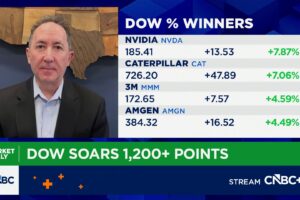
Is Meta Platforms next in line for a stock split? Find out why it may happen soon — or not.
Facebook and Instagram parent Meta Platforms (META -0.19%) is soaring. The stock is trading at all-time highs after rising 91% in the last 52 weeks. It also commands a beefy stock price at $565 per share. Is this “Magnificent 7″ stock headed for a stock split in the near future?
What’s the point of a stock split, anyway?
Let’s start with the basics. A stock split simply changes the number of shares that represent a company’s total market value. 10 million shares worth $100 each adds up to a $1 billion market capitalization. 100 million shares priced at $10 per share works out to the same market cap. Changing the ratio neither adds nor destroys value for existing shareholders.
That said, stock splits aren’t completely pointless. A lower share price can make the stock more easily accessible to investors with modest budgets, especially if they don’t have a brokerage account that supports buying or selling a fraction of a full share. The price per share can also make a difference for stock options, where a standard contract represents the right to buy or sell 100 shares at a specific price.
That adds up in a hurry when stock prices are high. For example, an “in the money” call option contract for Meta stock is worth about $56,500 today. That’s not pocket change for most people, and enough to make large corporations think twice about compensation policies based on stock options.
Quirks of Meta’s stock-based compensation plan
Meta makes heavy use of stock-based compensation. The company calls it share-based compensation in its financial filings, amounting to $8.2 billion in the first half of 2024. That’s 17.5% of Meta’s total operating costs, up from 16.2% in the first half of 2023. So Meta should manage its stock price to control its share-based compensation expenses, right? It’s tough to provide fair wages to each worker when a single options contract is worth more than $50,000, after all.
But Meta has dodged that issue by doling out stock-based compensation in a different way. Besides their ordinary cash paychecks, Meta employees are paid in restricted stock units (RSUs). These are single shares, not large option contracts. Over time, the units convert into regular shares that can be sold on the open market.
So the stock-based compensation program won’t force Meta’s hand into splitting the stock. The company still has fairly granular control over its total wages at these stock prices.
Should Meta aim for a Dow Jones membership?
I could also argue that Meta should split its stock if it ever wanted to become a part of the prestigious Dow Jones Industrial Average (^DJI 0.20%) market index. It’s a price-weighted index, giving high-priced components a larger influence over the total index value.
The current prices among the 30 Dow components range from $22 to $574 per share. Dropping Meta Platforms in that mix would instantly match the most influential piece of that market puzzle, accounting for roughly 8% of the index score.
But the tech sector already has plenty of representation in that index, including fellow Magnificent 7 stocks Apple and Microsoft. Adding another tech heavyweight like Meta to that list would arguably tilt it too heavily in the direction of Silicon Valley.
So the Dow doesn’t seem like a reasonable motivation for splitting Meta’s stock, either.
Final verdict: Meta probably won’t split its stock soon
Meta Platforms isn’t desperate to join the Dow Jones index. A lower share price wouldn’t grease the gears of its stock-based compensation program. A stock split would perhaps boost the stock very briefly, as these moves generally indicate that the board of directors expects stock prices to rise even further. But I already mentioned that the stock is surging to record highs and really doesn’t need an artificial short-term boost from that type of announcement.
The company could do it anyway to keep up with the cool kids and perhaps get a temporary price bump from the resulting media coverage. But Meta Platforms has no serious reasons to take that step, and I’m not holding my breath for that press release. The company hasn’t split its shares after 14 years on the public markets, and I don’t see why that should change in 2024.
Randi Zuckerberg, a former director of market development and spokeswoman for Facebook and sister to Meta Platforms CEO Mark Zuckerberg, is a member of The Motley Fool’s board of directors. Anders Bylund has no position in any of the stocks mentioned. The Motley Fool has positions in and recommends Apple, Meta Platforms, and Microsoft. The Motley Fool recommends the following options: long January 2026 $395 calls on Microsoft and short January 2026 $405 calls on Microsoft. The Motley Fool has a disclosure policy.








